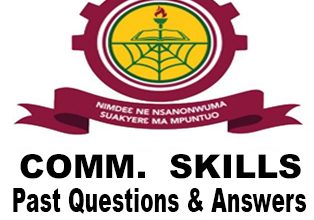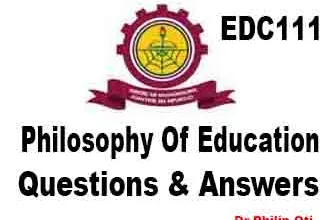AAMUSTED
Summary of Philosophy Of Education (Chapter One 1)
Aamusted Philosophy of Education EDC 111
CHAPTER ONE
INTRODUCTION TO PHILOSOPHY
- THE MEANING AND NATURE OF PHILOSOPHY
- What is Philosophy?
- The Origin of Philosophy
- The Scope
- Characteristics of Philosophy
- Importance of Studying Philosophy
- Branches of Philosophy
- Logic and Fallacies
Recommended
Summary of Philosophy Of Education (Chapter One 1)
Summary of Philosophy Of Education (Chapter Two 2 & 3)
Summary of Philosophy Of Education (Chapter Two 4)
Summary of Philosophy Of Education (Chapter Two 5)
Summary of Philosophy Of Education (Chapter Two 6)
Summary of Philosophy Of Education (Chapter Two 7 & 8)
Origin of Philosophy
- The word philosophy originated from the two Greek words ‘Philo’ meaning love and ‘Sophia’ meaning
- Philosophy is therefore literally translated as the love of wisdom.
- It refers to the search for wisdom, truth, or fact and the relationship among ideas.
- The man who engages himself in this effort is called a philosopher.
- In the words of Plato, he who has a taste for every sort of knowledge and who is curious to learn and is never satisfied may be termed aPHILOSOPHER.
WHAT IS PHILOSOPHY?
- Generally, there is no single universally accepted definition of the term philosophy.
- Schofield simply refers to philosophy as the process of asking questions.
- Gyekye (1996) sees philosophy as a rational, critical and systematic inquiry into the fundamental ideas underlying human activities.
- Philosophy is the study of general and fundamental problems, such as those connected with existence, knowledge, values, reason, mind, and language.
CHARACTERISTICS OF PHILOSOPHY
- Philosophy begins with intellectually credible questions but it does not provide readily verifiable answers to those questions.
- It also uses methodological or systematic procedures to arrive at the truth.
- The most outstanding method of philosophy is
- Whatever conclusions that emerge from philosophical inquiry should be regarded as
- Every philosophical truth is dependent on time, place or environment.
- Curiosity, wonder and doubt constitute the foundation of all philosophical endeavors.
- It is an intellectual discipline which requires critical thinking.
- Philosophers give a thoughtful meditative attention to microscopic issues. Thus, they do not hastily brush over or ignore issues.
- Philosophers demand self-awareness and also call for open-mindedness, objectivity, fairness in examining issues that confront man.
- Four ingredients of philosophy are: Speculations, Analysis, Synthesis, and Evaluation.
THE TEN COMMANDMENTS OF PHILOSOPHY BY POJMAN
- Allow the spirit of wonder to flourish in your breast
- Doubt every claim you encounter unless the evidence convinces you of its truth
- Love the truth
- Divide and conquer
- Collect and construct
- Conjecture and refute
- Revive and rebuild
- Seek simplicity
- Live the truth
- Live the good.
Recommended
Summary of Philosophy Of Education (Chapter One 1)
Summary of Philosophy Of Education (Chapter Two 2 & 3)
Summary of Philosophy Of Education (Chapter Two 4)
Summary of Philosophy Of Education (Chapter Two 5)
Summary of Philosophy Of Education (Chapter Two 6)
Summary of Philosophy Of Education (Chapter Two 7 & 8)
IMPORTANCE OF PHILOSOPHY
- The study of Philosophy enables us to think carefully and clearly about important issues.
- In philosophy, we learn to take a step back from our everyday thinking and to explore the deeper, bigger question which underpins our thought.
- The focus in the study of Philosophy is to learn not what to believe, but how to think.
- Studying philosophy sharpens your analytical abilities, enabling you to identify and evaluate the strengths and weaknesses in any position.
- It enhances your ability to construct and articulate cogent arguments of your own.
- 6. It prompts you to work across disciplinary boundaries and to think flexibly and creatively about problems which do not present immediate solutions.
- 7. Because philosophy is an activity as much a body of knowledge, it also develops your ability to think and work independently.
BRANCHES OF PHILOSOPHY
- There are three (3) principal branches or divisions of philosophy. These are;
- Metaphysics
- Epistemology
- Axiology (ethics).
WHAT IS METAPHYSICS?
- The term metaphysics is an English translation of the Greek expression “ta meta physica” which means “things beyond the physical realm”.
- It seeks to understand the nature of the world (universe).
- It tries to understand the world and what it is made up of (cosmology). Metaphysics answers questions like;
- Who am I ?
- What is the composition of the sun, moon, stars?
- Does God really exist? Who created God?
- Who created man? What is man-made of?
- What happens after death?
Recommended
Summary of Philosophy Of Education (Chapter One 1)
Summary of Philosophy Of Education (Chapter Two 2 & 3)
Summary of Philosophy Of Education (Chapter Two 4)
Summary of Philosophy Of Education (Chapter Two 5)
Summary of Philosophy Of Education (Chapter Two 6)
Summary of Philosophy Of Education (Chapter Two 7 & 8)
WHAT IS AXIOLOGY?
- It is the study of the general theory of values or general value of things.
- It deals with what is good or bad, right or wrong, ugly or beautiful etc.
- axiology studies three areas namely
- Ethics
- Aesthetics
- Logic
Ethics
- Ethics is known as moral philosophy.
- It deals with judgement of righteousness and wrongness, goodness or badness, virtues and vices.
- In short, this branch observes the principles of conduct which help to judge whether an action is right or wrong.
- Ethics examines what is moral or good behavior.
- What is right? Who determines what is right?
- Is right the same everywhere?
- What is wrong?
- Can there be a perfect man?
Aesthetics
- Aesthetics is concerned with beauty: example painting, taste, art and drawings.
- It analyses beauty and ugliness, their characteristics and standards of measuring the two concepts that is taste and appreciation.
- what is ugly?
- Is beauty universal or lies in the eyes of the beholder?
- Is there bases for organizing beauty contest?
- What do we mean by beauty? Is there inner and outer beauty?
- Can we ever have objective judges of art?
Logic
- Logic deals with the rules and techniques of reasoning.
- It applies the scientific method of inquiry through inductive and deductive reasoning.
- It further refers to the ability to test arguments for logical consistency, understand the logical consequences of certain assumptions, and distinguish the kind of evidence a philosopher is using.
- Logical thinking or inferences, imagination or supposition are considered under this division of axiology.
- It is used to distinguish good arguments from bad ones.
Epistemology
- It comes from the Greek word episteme, meaning “knowledge.
- This branch of philosophy engages in critical examination of the nature, sources, scope, validity and limit of human knowledge.
- What do we know?
- How did we know what we know?
- How do I know that I know?
- Is truth absolute?
- Where does knowledge come from?
- Can we forget what we know?
- Why do we forget what we know?
Recommended
Summary of Philosophy Of Education (Chapter One 1)
Summary of Philosophy Of Education (Chapter Two 2 & 3)
Summary of Philosophy Of Education (Chapter Two 4)
Summary of Philosophy Of Education (Chapter Two 5)
Summary of Philosophy Of Education (Chapter Two 6)
Summary of Philosophy Of Education (Chapter Two 7 & 8)
FOUR CONCEPTS OF KNOWLEDGE
- DOGMATISM
- SKEPTICISM
- AGNOSTICISM
- FALLIBILISM
MEANING OF THE TERMS DOGMATISM:
- They believe that it is possible to know.
- They assert that one can know and that their knowledge is real.
- This is usually held by religious faiths such as Muslims and Christians.
MEANING OF THE TERM FALLIBILISM:
- The Fallibilists asserts that man is fallible and therefore is likely to be incorrect in our knowledge or judgments.
- So the fallibilists are not certain whether we can have absolute truth or solid factual knowledge.
MEANING OF THE TERMS SKEPTICISM
- The skeptics believe that to know is impossible.
- They claim that we simply do not know and cannot know for certain.
- They have the questioning attitude towards the possibility of having any knowledge.
- To them, “man knows not and knows not that he knows not”
MEANING OF THE TERMS AGNOSTICISM:
- The Agnostics are not sure whether they know or not.
- If you ask them whether man knows or not, their reply is that we do not know.
- Does God exist? Their reply will be “we do not know”.
- They are neither Dogmatists or Skeptics.
TYPES OR SOURCES OF HUMAN KNOWLEDGE
Type of knowledge is determined by how they are received or their sources. Some of these sources are
- Empirical Knowledge/ Scientific knowledge
- Revealed knowledge/divine knowledge
- Intuitive knowledge
- Rational knowledge
- Authoritative/Expert knowledge
Recommended
Summary of Philosophy Of Education (Chapter One 1)
Summary of Philosophy Of Education (Chapter Two 2 & 3)
Summary of Philosophy Of Education (Chapter Two 4)
Summary of Philosophy Of Education (Chapter Two 5)
Summary of Philosophy Of Education (Chapter Two 6)
Summary of Philosophy Of Education (Chapter Two 7 & 8)
Revealed Knowledge
- This type of knowledge is obtained from God and other supernatural or ultimate realms.
- This knowledge is normally revealed to the prophets, priests and other recipients through visions, dreams, revelations and trances.
- The problems with this type of knowledge are that;
- It is not open to observation and cannot be subjected to empirical test.
- This type of knowledge cannot be proven by mere logic and reasoning.
Empirical or Scientific Knowledge
- This knowledge is derived from observing things around our senses-seeing, touching, feeling, smelling and tasting.
- Educators can help their learners obtain this knowledge through excursions or field trips to encourage students get hands-on experience.
- It is a body of ordered knowledge that is received from research.
Authoritative/Expert Knowledge
- This type of knowledge is obtained from someone known to be a specialist in any field of knowledge who has written or posited a theory. Ideas expressed by experts such as Charles Darwin, Aristotle, Galileo etc. on their various domains.
Intuitive Knowledge
- This type of knowledge emanates from the ability to understand or know something momentarily through feeling or instinct rather than facts. It refers to the ability of a person to make a quick guess. It lacks convincing explanation. It is non-intellectual but very good for innovations and creativity.
Rational Knowledge
- This knowledge is acquired through the use of thinking or reasoning faculties. The rationalist believe that the authentic knowledge should first come from the mind. The main method of rational knowledge is Inference (Deductive and Inductive).
- The mathematical subjects are examples of rational knowledge.
Recommended
Summary of Philosophy Of Education (Chapter One 1)
Summary of Philosophy Of Education (Chapter Two 2 & 3)
Summary of Philosophy Of Education (Chapter Two 4)
Summary of Philosophy Of Education (Chapter Two 5)
Summary of Philosophy Of Education (Chapter Two 6)
Summary of Philosophy Of Education (Chapter Two 7 & 8)
LOGIC/FALLACIES
- Logic is the systematic study of the rules for the correct use of these supporting reasons, rules we can use to distinguish good arguments from bad ones.
- Most of the great philosophers from Aristotle to the present have been convinced that logic permeates all other branches of philosophy.
- The ability to test arguments for logical consistency, understand the logical consequences of certain assumptions, and distinguish the kind of evidence a philosopher is using are essential for “doing” philosophy.
What is a fallacy?
- A logical fallacy or fallacy for short is an argument that contains a mistake in reasoning. mistaken belief, especially one based on unsound argument.
- A failure in reasoning that renders an argument invalid.
Examples of Logical Fallacies are;
- Personal Attack (Ad Hominen)
- Attacking the Motive
- Look Who’s Talking (Tu Quoque, /tu kwoʊkwɛ/ )
- Scare Tactics/Appealing to force
Other Examples of Fallacy
- Appeal to Pity
- Bandwagon Argument
- Begging the Question
- Inappropriate appeal to authority
- Appeal to ignorance
- Loaded questions/complex question
- Questionable cause/False cause
- Hasty generalization
Questionable Cause/False cause
- Presuming that a real or perceived relationship between things means that one is the cause of the other.
- This fallacy occurs when an arguer gives insufficient evidence for a claim that one thing is the cause of another.
- You should recognize the following instances of Questionable Cause:
- Post hoc fallacy
- Mere correlation fallacy
- Oversimplified cause fallacy
Loaded Question:
- Asking a question that has an assumption built into it so that it cannot be answered without appearing guilty.
- This fallacy is committed when an arguer asks a question that contains an unwarranted assumption.
- Have you stopped smoking?
- When did you stop beating your wife?
- Where did you hide the body?
- Why do you always act like a total jerk whenever you’re around my ex-boyfriend?
- Did you write this immoral trash?
- This type of fallacy involves presupposition
Recommended
Summary of Philosophy Of Education (Chapter One 1)
Summary of Philosophy Of Education (Chapter Two 2 & 3)
Summary of Philosophy Of Education (Chapter Two 4)
Summary of Philosophy Of Education (Chapter Two 5)
Summary of Philosophy Of Education (Chapter Two 6)
Summary of Philosophy Of Education (Chapter Two 7 & 8)
Ad Hominem
- This fallacy is committed when the arguer ignores the merits of his/her opponent’s argument, and rather makes some reference to the arguer himself/herself, and assumes that this somehow discredits the argument.
- Attacking your opponents character or personal traits in an attempt to undermine his/her argument.
- Poisoning the well – presenting adverse information about a target person with the intention of discrediting everything that the target person says.
- Appeal to motive – dismissing an idea by questioning the motives of its proposer.
- Tone policing– focusing on emotion behind a message rather
Other Forms of Ad Hominem
- Ad Hominem: Abusive
- When the arguer verbally abuses his/her opponent, rather than addressing their argument.
- Ad Hominem Circumstantial
- When the arguer, rather than addressing their opponent’s argument, merely points out that their opponent’s circumstances may be influencing their position.
- Ad Hominem Tu Quoque
- When A argues that some activity is wrong, and B responds by merely pointing out that A executes that activity him/ herself.
HASTY GENERALIZATION:
- This fallacy occurs when an arguer draws a general conclusion from a sample that is either biased or too small. A biased sample is one that is not representative of the target population.
- The target population is the group of people or things that the generalization is about.
- Hasty generalizations can often lead to false stereotypes.
- I’ve met three Chinese and they all smoke cigarette. My conclusion is that all Chinese are cigarette smokers.
Ad Populam (Mass Opinion) or Bandwagon
- When arguer appeals to band wagoning, snobbery, or fear of being different than the majority in order to influence the argue.
- Appealing to popularity or the fact that many people do or say something as an attempted form of validation.
Appeal to Ignorance:
- The arguer asserts that a claim must be true because no one has proven it false, or conversely, the arguer asserts that a claim must be false because no one has proven it98/ to be true.
- There must be intelligent life on other planets. No one has proven that there isn’t. There isn’t any intelligent life on other planets. No one has proven that there is.
Why is this an appeal to ignorance?
- Both claims suffer from the basic flaw that they assume that the lack of evidence for (or against) the claim is good reason to believe that the claim is false (or true).
Recommended
Summary of Philosophy Of Education (Chapter One 1)
Summary of Philosophy Of Education (Chapter Two 2 & 3)
Summary of Philosophy Of Education (Chapter Two 4)
Summary of Philosophy Of Education (Chapter Two 5)
Summary of Philosophy Of Education (Chapter Two 6)
Summary of Philosophy Of Education (Chapter Two 7 & 8)
Inappropriate Appeal to Authority:
- Using the opinion or position of an authority figure or institution of authority in place of an actual argument.
- This fallacy occurs when an arguer cites an authority who, there is good reason to believe, is unreliable. You should recognize the following instances of inappropriate appeals to authority:
- When the source cited is not a genuine authority on the subject under consideration.
- When there is reason to believe that the source is biased.
- When the accuracy of the source’s observations is questionable. When the source cited (e.g. a media source, reference work, or Internet source) is known to be generally unreliable.




